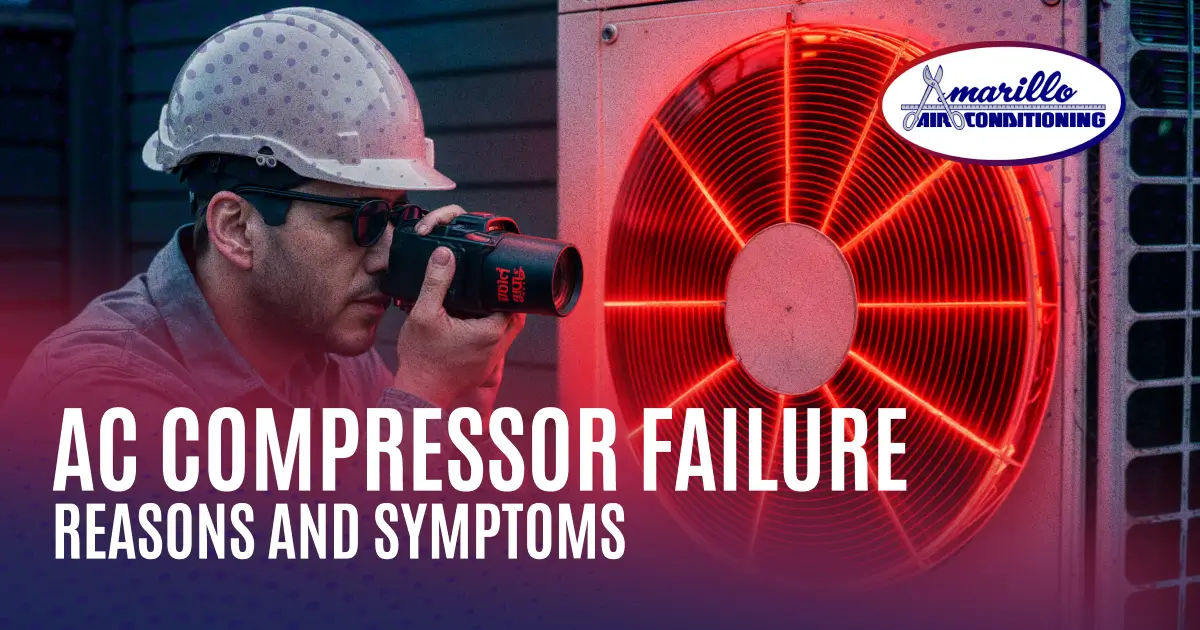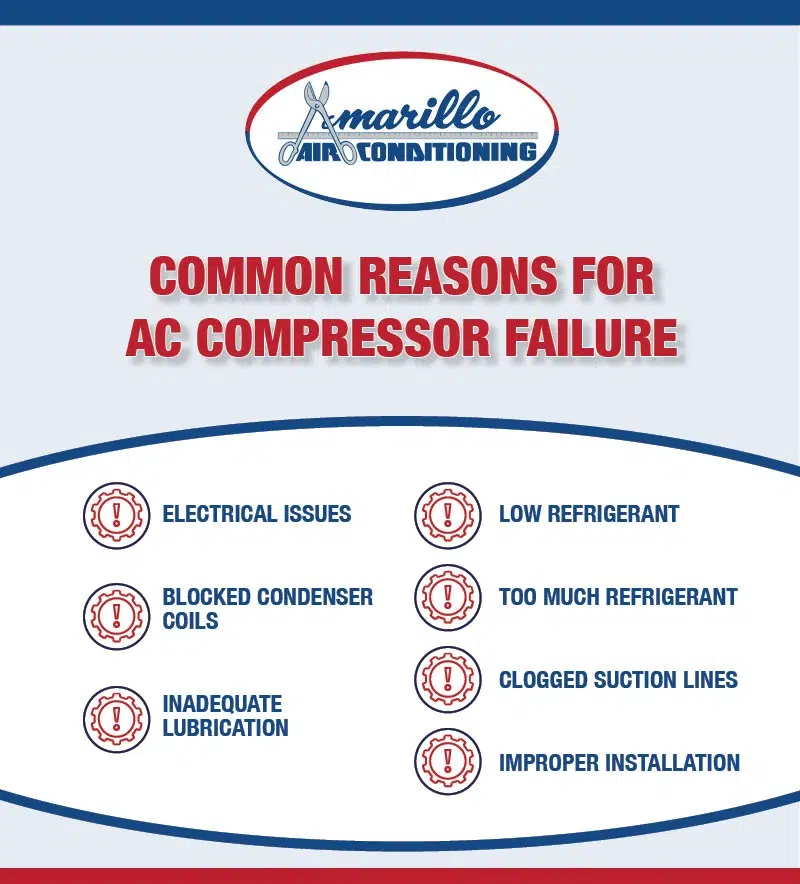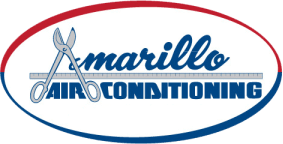AC Compressor Failure Reasons and Symptoms to Watch Out For

What’s in This Guide:
- Common Reasons for AC Compressor Failure
- Early Symptoms of Air Conditioning Compressor Going Bad
- What to Do if Your AC Compressor Stops Working
- How to Prevent AC Compressor Failure
- Frequently Asked Questions
The compressor is known as the heart of your air conditioner as it helps pump refrigerant through the system. It transfers heat from the refrigerant to the condenser to help cool the air sent into your home. If the compressor stops working, your AC system cannot function properly and will eventually break down. In this article, we’ll discuss the top AC compressor failure symptoms so you know the signs to look out for and can take action.
Common Reasons for AC Compressor Failure
Electrical issues, blockages, broken components, and other culprits can put excess stress on the compressor, causing it to overheat or fail. The top reasons for compressor failure include:

- Electrical issues: Electrical issues are one of the leading causes of AC compressor failure. Damaged wires, fuses, contactors, or power surges can all cause electrical malfunction.
- Blocked condenser coils: Dirt and debris can build up on the condenser coils, stopping them from releasing heat and putting excess pressure on the compressor. If not cleaned, the compressor will eventually overheat and fail.
- Inadequate lubrication: Your AC unit requires lubrication to function properly. Without it, the system has to go into overdrive to function, which can result in compressor failure.
- Low refrigerant: Refrigerant is essential for the proper function of your AC unit. If the levels are too low due to a leak, it can put too much pressure on the compressor and cause it to collapse.
- Too much refrigerant: Too much refrigerant in your system can also lead to increased pressure on the compressor, which can result in failure.
- Clogged suction lines: Clogged suction lines can stop refrigerant flow through your system, putting too much stress on the compressor and other components.
- Improper installation: If your system’s suction lines or other components are installed incorrectly, the compressor can overheat and cause the system to break down.
Early Symptoms of Air Conditioning Compressor Going Bad
Knowing the early signs that your AC compressor is failing can help you get ahead of the issue and prevent a complete breakdown. The top symptoms to look out for include:
- Strange noises: If your AC system is howling, rumbling, clicking, or making any other strange noises, it may be a sign of electrical issues or loose components that can cause compressor failure.
- Cool air sent outside: The compressor removes hot air from your home and releases it outside. If you hold your hand by the outdoor section of the unit and the air is cool, this is a key indicator that the compressor is not functioning correctly.
- The compressor won’t turn on: When you turn your unit on, you should hear the compressor working. If you can’t hear it over the fan, an issue likely has caused it to fail.
- Moisture around the unit: If you notice leaks or puddles surrounding your AC unit, there is likely a refrigerant leak. You must address leaks immediately, as they can put too much pressure on the compressor and cause serious health hazards.
- Inadequate airflow: If your AC system is no longer able to cool your home as it used to, there is likely an issue with the compressor or another component.
- Rising energy bills: When the compressor starts to fail, your AC system has to go into overdrive to operate, resulting in increased energy usage. If your energy bills suddenly increase, there is likely a problem that needs addressing.
What to Do if Your AC Compressor Stops Working
If your AC compressor stops working, there are some troubleshooting steps you can take before contacting a technician:
- Check the power to the unit. A blown fuse or tripped breaker can cause the power to fail and may be why your system has stopped working.
- Check the connections. Inspect the system for loose connections or parts. You can also open the cover to assess the internal parts. If any connections are loose, you can try tightening them to resolve the issue.
- Look for debris buildup. If dirt or debris has built up around the system, professional cleaning may be all that’s required to get it back in working order.
If these steps don’t help, contact a licensed technician. They have the experience and training to diagnose the issue and complete the necessary repairs.
How to Prevent AC Compressor Failure
The best way to prevent AC compressor failure is to keep up with annual maintenance. Schedule a preventative maintenance visit at least once per year will help you avoid costly repairs, extend the lifespan of your system, and ensure everything is working correctly. During the maintenance visit, the technician will complete a full inspection, cleaning, and unit tune-up. If they detect any minor repairs, they will fix them before they become significant issues.
Along with professional maintenance, there are some steps you can take at home to prevent AC compressor failure, including:
- Visual inspections to check for damage
- Installing a surge protector
- Ensuring the unit is free of surrounding clutter
- Only booking AC service with reputable companies
- Keeping the coils and unit free of dirt and debris
Call Amarillo Air for AC Services in Texas
If your AC system shows signs of compressor failure, contact our team at Amarillo Air. We offer expert AC repairs, maintenance, and installations in Amarillo and surrounding areas. Our fully licensed technicians are available 24/7, so you can count on us to be there for emergency service no matter the time or day.
Book online or contact us to schedule your service today! Remember to ask about our Home Comfort Club, where members receive scheduled HVAC maintenance, service discounts, and other exclusive benefits. We also offer flexible financing options, so you don’t have to worry about your AC service breaking the bank.
Frequently Asked Questions
Is it worth repairing a failing compressor, or should I replace the whole unit?
Determining whether to repair the compressor or replace the entire AC unit depends largely on the extent of damage and the age of your system. If your unit is nearing the end of its lifespan and the repair costs will outweigh the cost of replacement, it’s best to upgrade to a new system.
What is the typical lifespan of an AC compressor?
The typical lifespan of an AC compressor is between 12 and 15 years. After this, wear and tear will start to take its toll on the compressor and eventually cause it to break down. If your unit is nearing the end of its lifespan, contact our team to discuss your options for AC replacement in Amarillo and surrounding areas.
Can an aging AC unit cause the compressor to fail?
An aging AC unit can cause the compressor to fail as the key components begin to wear down. This can put excess strain on the compressor, which will eventually cause it to overheat or break down. It’s best to replace your AC system when it is nearing the end of its lifespan to avoid unexpected breakdowns.
CONTACT Amarillo Air Conditioning, Inc.
100% Satisfaction
Our installation technicians are the best in skill, attitude and workmanship. They will care for your home and complete the job with speed and precision. They will not wear shoes on your carpets. They will clean up when they are finished and take personal responsibility for your satisfaction. They will not smoke or swear in your home and they are drug-free. If, when they have finished in your home, they have not performed in accordance with these high standards, we won't consider the job done until you are satisfied with the results.
